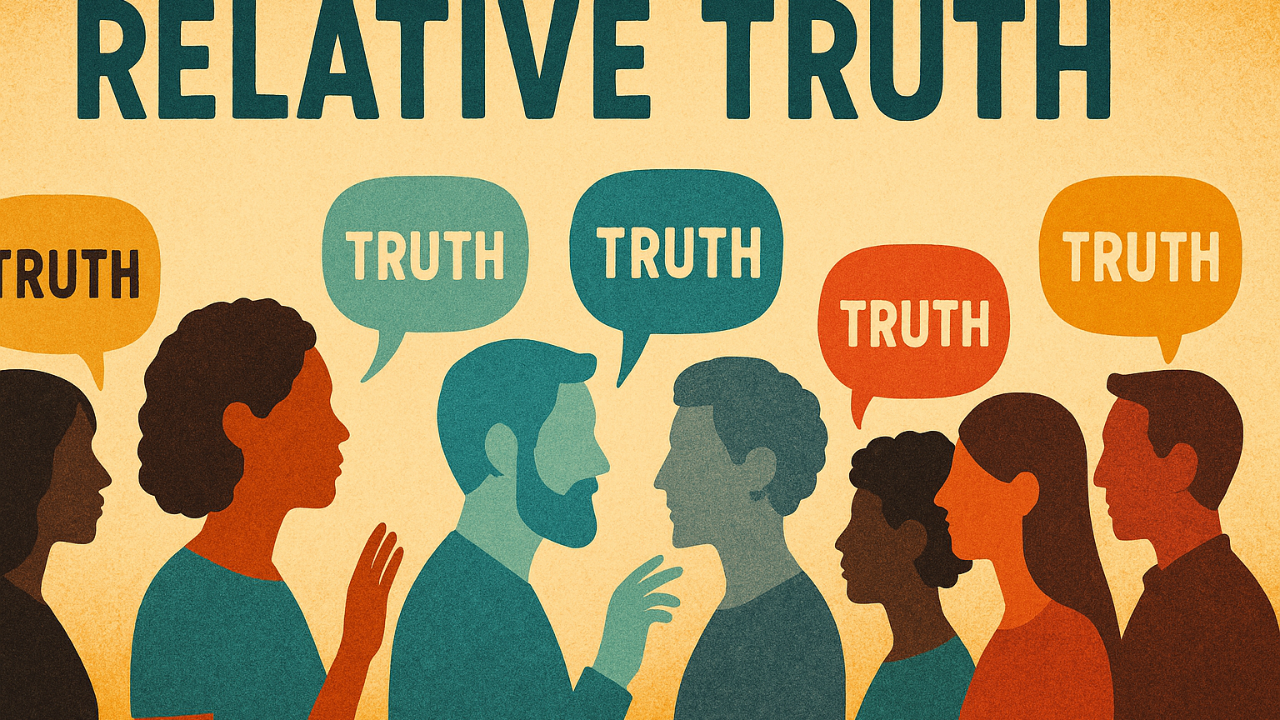Relative Truth and the Relativism Trap: Why "Your Truth" Isn’t Enough

We live in an age where “living your truth” is considered a moral high ground. And on the surface, that phrase sounds empowering—liberating, even. But scratch a little deeper and you’ll find something far less virtuous: a culture that has lost its grip on truth altogether.
This cultural shift didn’t appear out of thin air. It’s the philosophical legacy of postmodernism, a worldview that emerged from the ruins of two world wars and settled into the Western academy like ivy on a crumbling wall. Postmodern thinkers like Michel Foucault didn’t just question power—they interrogated the very idea of truth itself. Foucault famously declared, “Truth is a thing of this world: it is produced only by virtue of multiple forms of constraint.” Translation? What we call “truth” is really just the narrative of whoever holds the power.
Now, to be fair, there’s a kernel of insight in what Foucault says. History is full of examples of institutions masking oppression behind claims of “truth.” But the mistake is universalizing that insight—turning skepticism of authority into a full-on assault against the very existence of objective, eternal truth.
Enter moral relativism: the unfortunate child of postmodern doubt and spiritual laziness.
This idea—popular in universities and pop culture alike—teaches that what is “true for you” may not be “true for me,” and that’s just fine. It sounds tolerant. But it’s intellectually inconsistent, and worse, spiritually paralyzing.
Let’s get one thing clear: there ARE truths. Not trendy preferences, not situational ethics—truths. Eternal ones. Revealed by God. They are not democratically voted into existence, nor do they care how strongly we “feel” about them. They predate your opinion and will outlast your FaceBook bio.
Yes, there are areas of life where preference and nuance reign. You may prefer low-carb to paleo (both are better than a high-carb diet). You might think one major is better than another. You might choose to homeschool your kids or send them to public school. That’s fine. But whether or not adultery is wrong? Whether stealing is immoral? Whether life is sacred? These are not up for reinterpretation based on vibes.
Relativism wants to flatten the world into a buffet line of moral options: “Pick whatever suits your palate.” But the gospel isn’t a buffet. It’s a covenant. And covenants come with standards—real ones.
Let’s not pretend that relativism is morally neutral. It’s not. It quietly neuters the moral imagination. It erodes the urgency of repentance. After all, if all choices are equally valid, what’s the point of change? Why stretch toward godliness when the world applauds you for being “authentic” just as you are?
But the gospel of Jesus Christ does not flatter the natural man.
As Amulek taught, the Savior came not to save us in our sins but from them (Alma 11:34–37). And that distinction matters. Repentance is not moral rebranding. It’s a call to align with something higher, something eternal.
God’s commandments are not arbitrary rules designed to suppress expression or preference. They are, as Elder D. Todd Christofferson put it, “loving instructions from a divine Father whose goal is our eternal happiness.” Or as Nephi reminds us, “He doeth not anything save it be for the benefit of the world” (2 Nephi 26:24).
Let’s be honest—moral relativism is a useful tool for the uncommitted. It offers the illusion of freedom without the burden of accountability. It gives you the thrill of moral high ground without the inconvenience of actually climbing. It lets you baptize your own opinions and label them “true,” while dismissing revealed commandments as outdated or “your truth, not mine.”
But relativism doesn’t lead to growth. It leads to stagnation. It doesn’t liberate the soul, it anesthetizes it. It turns sin into lifestyle branding and repentance into an unnecessary chore. And in doing so, it strips the gospel of its transforming power.
When we anchor ourselves to absolute truth—God’s truth—we commit to something more than self-expression. We commit to becoming. The plan of salvation is a roadmap toward transformation, toward sanctification, not mere self-affirmation.
As Elder Dale G. Renlund warns, “Without the Redeemer, the inherent hope and joy evaporate, and repentance becomes simply miserable behavior modification.” The atonement of Christ isn’t here to make bad people feel better. It’s here to make dead people alive. That kind of change requires more than personal preference. It demands repentance and repentance assumes that truth is real, fixed, and revealed.
So let’s stop pretending that all truths are created equal. Let’s stop trading eternal principles for social convenience. The gospel doesn’t bend to accommodate us; it lifts us to transform us.
“There is truth—and it’s not mine or yours. It’s God’s.”





